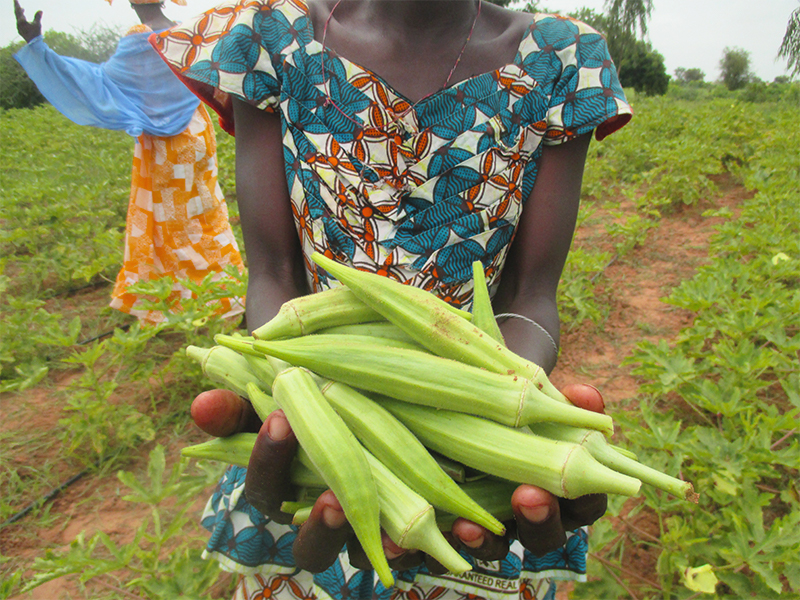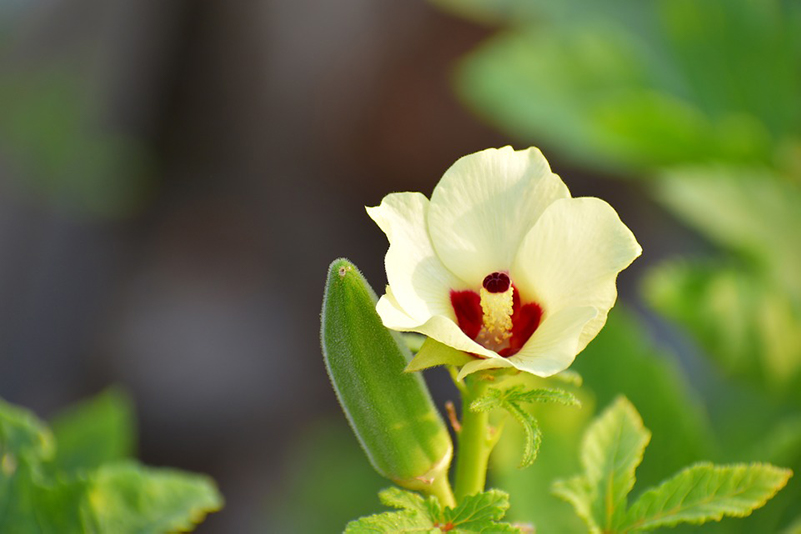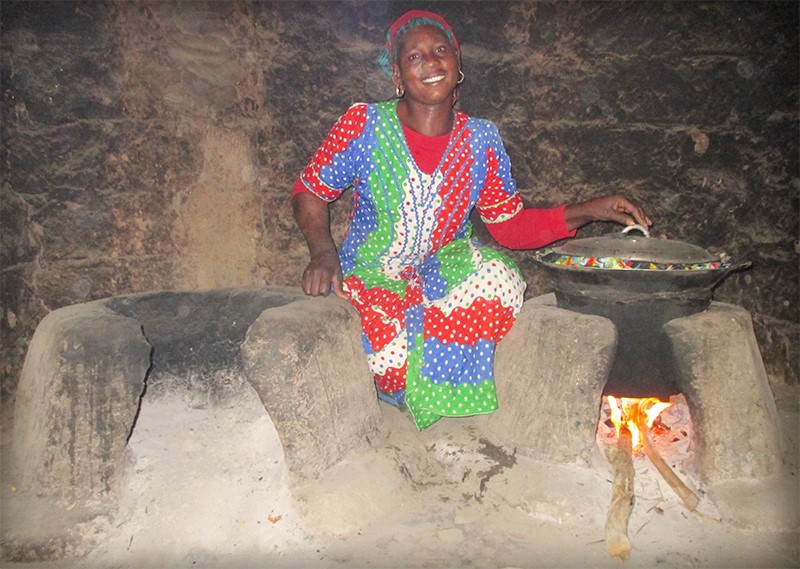In all of CREATE!’s communities, women prepare a variety of dishes in their favorite cook pot using their fuel-efficient cookstoves. These fuel-efficient cookstoves allow women to prepare meals using their customary methods and pots in a safer and more efficient way than traditional open fires.
Cuisine Using Fuel-Efficient Cookstoves
Senegalese cuisine is often determined by region, and in rural areas women cook over fires. In the more southern regions of Senegal, okra is popular to cultivate. These plants are known to be heat and drought resistant, and therefore perfect for surviving a desert climate. Because of this, our rural partner communities always keep a plot of okra in their cooperative gardens. Earlier this year, our partner community of Diender harvested 125 pounds of okra! You may be wondering what people can do with such a large amount of this unusual vegetable…
In southern Senegal, people often use okra in different stews. One of the most popular stews is soupoukandia. This dish is made with dried fish, a variety of vegetables, and most importantly, okra. When okra seed pods are cooked they produce an edible “goo” that gives okra dishes a distinguishable texture.
When it comes to cooking meals, including soupoukandia, fuel-efficient cookstoves only need 2-3 pieces of firewood per meal. By using less firewood, communities are reducing deforestation because people are using 60-70% less wood with each meal. It also decreases the time, money, and energy that women spend on collecting firewood. Therefore, women have more time to spend with their families and on income generating activities.

Fresh Okra harvest from a cooperative garden.
Fuel-Efficient Cookstoves and Culture
Because of the protective outer walls, fuel-efficient cookstoves have greatly decreased the number of fire related accidents in homes. Meals are an important way to connect with people, and families need a safe space to do so. Traditionally, people share the soupoukandia stew amongst neighbors, friends, family, and other guests.
Hospitality, known as teranga, is a way of life in Senegalese culture. It is important to make people feel welcomed, respected, and to offer them what you can and more. The belief is that there is always more. In an interview with The Splendid Table, Senegalese Chef, Pierre Thiam, explains that “When you share your bowl, your bowl will always be plentiful”. People’s generosity goes above and beyond here.
“This is a country that values the wealth of a person not by how much he has, but by how much he shares, by how much he gives.” – Chef Pierre Thiam

Okra plants grow beautiful large white flowers, similar to Hibiscus.
We would like to share the recipe for soupoukandia with you, so that you can try it at home with your friends and family! In our partner communities in Senegal, cooks add dried fish to the stew. With this American-style recipe, the dried fish is replaced with fresh seafood like mussels and shrimp.
Soupoukandia (Okra and Seafood stew)
Serves: 6-8
For the vegetable broth:
• 12 cups fish or vegetable stock
• 4 cups thick-sliced okra
• 3 bay leaves
• 2 medium yellow onions, roughly chopped
For the seafood soup:
• 6 tablespoons palm oil
• 4 tablespoons fish sauce
• 1 large eggplant, cut into large chunks, or 4 small Thai eggplants
• 2 habanero or Scotch bonnet chilies, slit in half lengthwise
• 24 mussels, cleaned and debearded
• 16 medium shrimp, peeled and deveined
• Freshly ground black pepper, to taste
• Cooked white rice, for serving
Directions:
1. Making the vegetable broth: Bring the stock to a boil in a 6-quart saucepan over high heat. Then add the okra, bay leaves, and onions. Reduce the heat to medium-low, and cook. Stir the broth occasionally, until the okra is tender and the stock had reduced by one-quarter. (About 1 ½ hours)
2. Making the seafood soup: Add the palm oil, 3 tablespoons fish sauce, eggplant, and chilies to the vegetable broth and cook. Stir the soup occasionally, until it has thickened and okra falls apart. (About 30 minutes)
3. Add the mussels and shrimp. Cover the pan, and cook until the mussels open and the shrimp are cooked through. (About 4 minutes)
4. To serve, remove from the pan from the heat and stir in remaining fish sauce and pepper. Ladle the soup into bowls, and serve the dish with rice.
Recipe from: http://www.saveur.com/article/Recipes/Senegal-Okra-Seafood-Stew
Pierre Thiam Interview: https://www.splendidtable.org/story/chef-pierre-thiam-teranga-is-the-word-that-symbolizes-senegal-the-best

